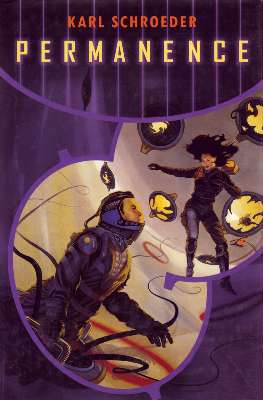The problem with talking about Permanence (2002), or any of Schroeder’s work really, is that it’s too easy to get caught up in talking about the wonderful ideas and backgrounds and not pay enough attention to the characters and stories. I think Schroeder’s one of the best writers to emerge in this century, and his work seems to me to belong to this century, to be using newly discovered science and extrapolating from present technology, not just using the furniture of science fiction we’ve been familiar with for decades. The idea density of Schroeder’s work reminds me of Poul Anderson. Permanence proposes two different answers to the Fermi Paradox, for instance. But it’s really all about the people. And what makes his work really unusual is that Schroeder pays as much attention to the social systems of the future as he does to the physics, or vice versa. It’s surprising how little SF does precisely calculated orbits and anthropology simultaneously.
Permanence is set in a future that we could still get to. This used to be ubiquitous for science fiction, but it seems to be getting rarer. When I see so many futures of alternate Earths I wonder whether science fiction has lost faith in the future. Schroeder definitely hasn’t. Permanence is set several centuries in our future. Humanity has spread through the nearer universe, building colonies on the halo worlds: worlds circling brown dwarfs and “lit stars” making great wheels of human civilization held together by slower-than-light cyclers. Then FTL was invented, and FTL needs big lit stars to work, so the halo worlds are becoming abandoned backwaters. FTL is synonymous with the Rights Economy, hypercapitalists who feel everything must be owned by a rights-holder, and everything must be labelled with nanotech tags telling you what it’s worth. This history lies beneath everything that happens in the novel; it has shaped the characters and their reactions, they are deeply rooted in it. These are people it’s easy to identify with, but people from very different cultures.
The story begins simply. Meadow-Rue Cassells has grown up in a halo habitat. Her parents are dead and she’s running away from a brother she believes wants to sell her. She flees to another halo world, and on the way discovers an abandoned cycler. So far so Rendezvous With Rama. But while there’s plenty of exploring nifty alien artifacts in Permanence, that’s only one of the points of focus. Rue wants to make the alien cycler part of the economy of the halo worlds. Other people have other ideas. This isn’t a book about exploration but about the question of the legitimacy of government, of revolution, of xenophobia, of aliens and their motivations, of what it means to be free and make choices and shape your environment. There is an enormous spaceship, there are people and aliens with their own agendas, there’s a man questioning his faith. There are a number of different cultures with their own ideas. There’s the interesting background detail that the Earth-culture that most influenced some of them is Japan—Shintoism is a major, if banned, religion, and people quietly and normally eat with chopsticks.
Permanence raises very interesting questions and answers them well, and while bubbling over with ideas also tells a story about what it means to grow up in the halo worlds. This is a book that reminds me why I love science fiction.
Jo Walton is a science fiction and fantasy writer. She’s published eight novels, most recently Half a Crown and Lifelode, and two poetry collections. She reads a lot, and blogs about it here regularly. She comes from Wales but lives in Montreal where the food and books are more varied.










